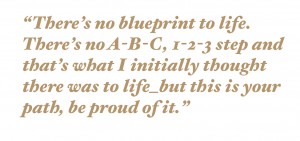Kimberly
While suffering from a chemical imbalance with schizophrenic and bi-polar symptoms, Kimberly felt everything was normal—it was the people around her who were acting strange. It wasn’t until she began to emerge from her illness that she became scared, realizing that what she saw as reality was false, and what she had deemed false was real.
A highly motivated college freshman, Kimberly had taken on a full class schedule and was awarded an internship reserved for upper classmen. One day at her internship she began having paranoid delusions, triggered, she later learned, by stress. “I immediately started to feel like people were out to get me. I tried to go with the flow but I couldn’t, and I just decided to quit. This was when the illness was starting to take form within my body, so while all this was happening I wasn’t the Kimberly that you’re seeing now.”
She told her boss she was quitting and remembers people coming into the office confused about what was happening. Her closest supervisor started crying and Kimberly was escorted by security from the building. Instead of going back to campus, which was her routine, she drove home. Her father immediately noticed a difference in her and recounted talking with her that night and hearing what he called “a demonic voice” coming out of his only daughter. The next morning he took her for psychiatric care.
 “My parents figured this out very quickly, they knew that from the time I got home I never wound down, I was wired, I stayed up, I was sort of ranting and babbling,” she recounts. When she got to the doctor’s office the next day she remembers thinking that he was out to get her and checked behind his computer screen to see if he was tampering with her college records.
“My parents figured this out very quickly, they knew that from the time I got home I never wound down, I was wired, I stayed up, I was sort of ranting and babbling,” she recounts. When she got to the doctor’s office the next day she remembers thinking that he was out to get her and checked behind his computer screen to see if he was tampering with her college records.
She barely remembers the next two years but calls it “the new normal.” “I just snapped from being Kimberly the normal college student, to Kimberly the normal person who was going through some crazy illness, but I didn’t know it. I had no idea that I was different, I only know now that whole turbulent experience happened because of what my parents told me.”
Her lowest point, what she calls her “darkest hour,” happened when she began to distinguish between what her mind was telling her and what was real. “It’s like, oh my goodness, I’m back functioning in society again.” That is when she asked God, why he had chosen her.
It was a combination of her faith and her therapy that she feels brought her back. “I feel like I’ve recovered, but although I feel stable, I feel like mental health in whatever capacity is always going to be a part of my life. I’ll never discard the diagnosis that was given to me, I’ll never sweep it under the rug.
When asked her advice to others going through what she experienced, she shared: “We’re all going through something and what I’ve learned is that this is just your journey and it’s unlike anyone else’s and there is not one other nearly close to what your journey is. There’s no blueprint to life. There’s no A-B-C, 1-2-3 step and that’s what I initially thought there was to life—but this is your path, be proud of it. Take your medicine if you’re on medicine. Do what the doctor prescribes you to do and just hold steady and latch onto people you feel are genuinely there for you.”
 Kimberly is back in school, going to a community college and embracing the disability services offered on campus. A largely African-American student population, she said, has misconceptions about mental illness and she is involved in Active Minds, a campus organization working to educate and de-stigmatize mental illness.
Kimberly is back in school, going to a community college and embracing the disability services offered on campus. A largely African-American student population, she said, has misconceptions about mental illness and she is involved in Active Minds, a campus organization working to educate and de-stigmatize mental illness.
“Within the African American community we have a lot of remedies, whether it be going to church or prayer or just family traditions where we think these things can heal, and they do, but I think mental illness is something that our community shies away from. It’s sort of tagged ‘Just Crazy’. I think that a brighter light could be shined on mental health in the African American community.”
She carries in her mind a quote that reminds her of how healthy living involves more than attention to the physical: “Not everyone has mental illness, but everyone has mental health. So you may not be diagnosed with a mental illness or a condition or disorder, but everybody has mental health. So I think about that when I don’t eat a hearty breakfast and I may go to school and try to focus on what the professor is saying, and my mind is over here doing this thing and my body is doing one thing. Your mind is always working and it’s a muscle that needs to be worked so just like you go to the gym and try to keep your body in shape, your mind needs that same sort of agility. It needs to work and you may not have an illness, but believe me, your mental health is always at work and it always needs some nutrition and it always needs just a good push in the right direction.”

It’s uplifting to see people overcoming problems while remaining positive. Kimberly could have easily fallen into the “blame game” but she chose a positive path. Great to read, and I wish her much success in the future.
The changes into the fast pace digital world seems to evoke a lot more stress on us. The older generation struggles to keep up, which sometimes pours down onto the rising newer generation. And the rising newer generation seems to be taking the brunt of the fast pace life that we tend to with the digital world. It seems the younger generation are getting smarter and more propelled to be accomplished. I think the more we talk about our inner feelings, confusions and mental health the better equiped we will all have in helping each other. What a beautiful mind Miss Kimberly has to be able to reach out and help herself and in the same way help others! This is a very important website. And I plan on letting others know about it. It is good to talk about and educate ourselves about these very deep stresses in life. YOU ARE BEAUTIFUL KIMBERLY!! And, thank you for what you can share.
Kim, not only is your story remarkable, it’s an inspiration for all of us dealing with “issues”. As you so wisely noted, everyone has some challenge in life. It’s how we deal with it that counts. When you can turn your challenge into a refrain of hope, you become a change agent. Someone’s life will be better because you showed them how to get up off the canvas.
Thank you so much for sharing your story! I am so glad that you are shining a light on this important issue. I loved what you said about everyone finding their own path. Your beaming smile gave me renewed hope for my own future.
I love to read these stories and thank you for sharing your experience. My son has mental illness and struggles with everyday life. This gives us hope and faith. I will encourage him to seek out an Active Mind program to get involved with. Take care and again, thank you for being courageous.
Thank you for sharing your story ! Your story helps me to know that there are more young people within the African American Community who are speaking out and advocating for so that their message and voices are being heard. I wish you nothing but the best in your journey and I hope that you continue to grow and stay strong..Let the light that you’ve been given continue to shine.